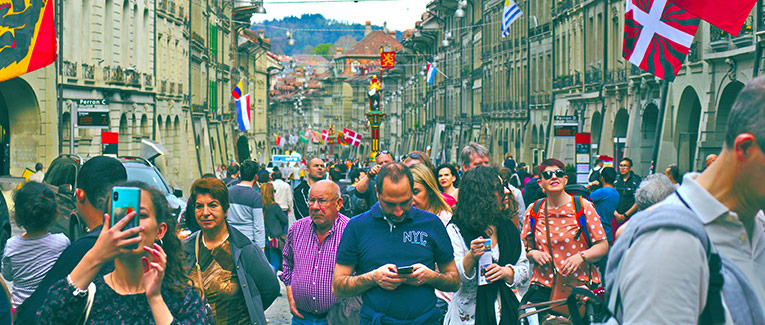
Overtourism has been around for at least four decades, but vacationers remain blissfully unaware.
There’s the root of the problem.
No traveler sets off on a mission to ruin residents’ lives, but the repercussions are too big for ignorance to continue being an excuse.
It’s time to look inward and take responsibility.
Unpacking Overtourism
Overtourism is defined by researchers Milano, Novelli, and Cheer as extreme amounts of tourists overcrowding residential areas, causing residents to suffer from lasting changes to their lives.
Between 2016 and 2020, the U.S. alone was responsible for a 9% spike in tourism in Europe. Despite governments imposing travel constraints and laws against impertinent tourist behavior, the situation continues to be a cause for concern.
Social media hasn’t helped matters either. According to a Schofields Insurance survey, 40% of tourists plan to travel to cities based on their “Instagrammability.” Also, with the silo that social media is, people build up the desire to visit these same cities that pop up on their feed, even if it was never on their bucket list.
The other major culprits are airlines and cruise lines. Travelers have two main considerations: time and budget, both of which the transport industry leverages as selling points by offering attractive packages.
Why wouldn’t anyone want to grab a discounted deal that promises them paradise? Passengers jump on a plane or cruise and service providers deliver them to the destination, but who faces the brunt of the barrage? The locals.
How Overtourism Affects Locals
Overtourism cultivates animosity in inhabitants. They feel a loss of personal space and belonging, causing them to react towards tourists with aggression, protests, resistance, or hiding. Having festered over years, anti-tourism and tourismphobia are as real as any stigma today.
Many would say their anger is justified. Overtourism affects nearly every aspect of locals’ day-to-day lives.
1. Physical and Environmental Impacts
How frustrated would you be if you had to wade through hundreds of strangers on your street every day? From grocery stores to public transport, tourists outnumber inhabitants by a large margin, leaving the latter feeling displaced in their own homes. Excessive crowding not only limits people’s access to amenities, but also strains a city’s infrastructure.
Further, overtourism damages the very beauty that people flock to see, by increasing pollution levels and land detriment, and endangering flora and fauna. At Thailand’s Maya Bay, the impact of 6,000 pairs of feet stampeding over a 250-meter-long strip daily was disastrous, as over half of the coral was destroyed, and the bay was shut down indefinitely.
2. Economic Impact
Every time you’ve booked an Airbnb in an over-toured place, you’ve been an inadvertent reason for driving up rent or land costs in that locality.
Short-term rental platforms have repeatedly been called out for fueling the phenomenon by enticing a section of the population to purchase homes and apartments for this business, while others struggle to pay their mortgage.
With this, the overall cost of living correspondingly rises, and employment instability becomes obvious. The inflow of everything in sporadic bursts is arguably the biggest problem with overtourism, including job opportunities and income, making them cyclical and unsustainable.
3. Socio-Cultural Impact
Holidaymakers are notorious for disrespecting what’s not their own. National treasures are defiled, establishments encounter rude and rowdy foreigners, and natives endure disparagement or disregard. Tradition is commodified to meet demand.
It doesn’t stop there. Social divides between the orthodox and modern become more apparent. People are stricken with identity issues, torn between retaining their culture and adapting to new ones.
Be the Change
Awareness and accountability are crucial to righting this wrong. Start by:
1. Traveling during off-peak seasons
If you absolutely must go to cities suffering from overtourism, do so when the crowds are relatively subdued. The country will remain the same despite weather changes, you’ll be contributing to their economy when it faces a slump, and it’ll be easier on your pocket if you find the right deals.
2. Pushing the boundaries
Venture beyond the heart of the city and frequented hotspots. Going off the beaten path will not only reveal local gems, but spare you from suffocating in crowds. If you think that’ll make you miss landmarks, think again. And if you’re concerned that getting away from tourist areas could put you at greater risk of getting sick or injured, buy travel medical insurance or travel insurance so you can explore with confidence.
3. Understanding and cooperating with guidelines
As a sensible global citizen, the least you can do is not disobey authorities’ efforts to curb overtourism in their nations. Look up timings of attractions, entry rules, etiquette in public places, and other specific restrictions while planning your travel, and abide by them once there. Stay informed and ensure those around you are, too.
4. Supporting small businesses
Sure, the best-rated restaurants and malls might be good, but wouldn’t you rather try the places where the locals eat, or shop with vendors they support?
Few things in life are as flavorful as Mexican street food, as exquisite as Murano glass, or as intricate as Balinese handicrafts. Don’t fall into the commercialization trap and miss them.
5. Blocking out the buzz and exploring options
Whether sightseeing or soul searching, travel should be for the self, not for likes on social media.
There’s no limit to destinations and experiences which are as good, if not better, than the must-sees being raved about. When you find pristine places, try not to post a barrage of stories and updates. Do your diligence to end the vicious social media-overtourism cycle.
The next time you travel, first ask: “Am I adding to overtourism?”
If the answer is no, you’ll know you’re doing the correct thing.
If it’s yes, you need a new plan.

